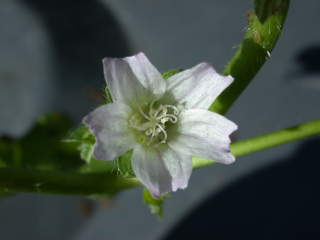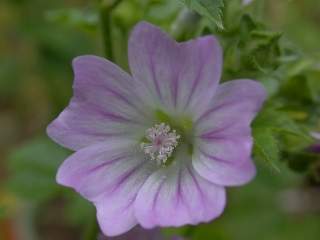
back to The Malva Pages

Malva linnaei M.F. Ray
Malva neglecta Wallr.
Malva nicaeensis All.
Malva parviflora L.
Malva pusilla Sm.
Malva verticillata L.
Malva ×adulterina Wallr.
These are a group of small-flowered annual or biennial species which share the characteristic of possessing only 3 coloured veins in each petal. Lavatera mauritanica would appear to have originated as a hybrid between Lavatera arborea and one of this group, perhaps Malva parviflora.
These species are generally of little horticultural merit, but the larger flowered forms of Malva linnaei are potential subjects for the garden, and Malva verticillata Crispa group is grown as an architectural and foliage plant as well as a salad vegetable.
 Malva
linnaei M.F. Ray.
Malva
linnaei M.F. Ray.![]() Cretan Hollyhock
Cretan Hollyhock![]() Cornish Mallow, Smaller Tree Mallow
Cornish Mallow, Smaller Tree Mallow![]() Cretan Mallow
Cretan Mallow![]() Cretan Mallow
Cretan Mallow lavatére de Crête, Malvones, mauve de Crête
Malva(loca), malvones
malva, malva crètica
![]() malva-bastarda
malva-bastarda malva di creta, malvone di Creta
![]() marva
marva Kretische Strauchpappel
falsk rödmalva, narrmalva
Rikkamalvikki
![]() slézovec krétský
slézovec krétský ![]() Morhocysen Fychan
Morhocysen Fychan![]() lavatero rozkolora, malvo rozkolora
lavatero rozkolora, malvo rozkolora
This plant is more commonly met under the name of Lavatera cretica L. It has recently been reclassified as Malva linnaei on the basis of morphological and molecular data, the traditional placement, on the basis of the presence of fused bracteoles, not being representative of its true relationships. See the page on the Malva alliance for further discussion of the classification of true mallows and lavateras.
Detailed description with photo-illustrations.
Malva linnaei M.F. Ray is an erect hairy annual or biennial found in the Near East and Mediterranean region, including North Africa and the Canary Islands, and in Western Europe north to Brittany and Cornwall, growing to 2-4 feet in height. It is also found (naturalised?) in Madeira and the Azores, and is naturalised in a number of other regions. It bears small lilac flowers, in clusters in the leaf axils, in early summer. The flower size is variable, some populations bearing flowers of a size typical of the weedy mallows, and others bearing larger flowers comparable in size to smaller flowered forms of Malva sylvestris.
Photographs
photographs in the Lavatera Gallery.
photograph at Department of Botany, U of Catania
photographat Belles Fleurs de France
photograph at Biodiversidad Iberobalear y Canaria
Malva neglecta Wallr.![]() Dwarf Mallow
Dwarf Mallow Malva enana
Malva domestica
cas, Casul popii, nalba-marunta, nalba mica
Gänse Malve, käsepappel
Klein Kaasjeskruid
skär kattost
Småkattost
Katinjuustonmalva
harilik kassinaeris
Drobny šlěz
ślaz zaniedbany
![]() sléz prehlížený
sléz prehlížený slez nebadaný
Navadni slezenovec
korovni sljez
mali slez
Paprastoji dedešva
novārta malva
Kerek levelü mályva, papsajtmályvának
![]() Hocysen Bychan
Hocysen Bychan![]() Malvo malgranda
Malvo malgranda![]() Nan-jaeng-i-a-uk
Nan-jaeng-i-a-uk
Malva neglecta is a hairy stemmed annual bearing clusters of small (¾"-1¼") pink to white flowers. The stems may be either erect, ascending or procumbent. It is native to North Africa, central and southern Europe and south west Asia.
It is naturalised in, among other places, New South Wales, Victoria, Tasmania, South Africa, Zimbabwe and Lesotho.
Synonyms of Malva neglecta include Malva rotundifolia auct. non L and Malva vulgaris Fries.
Malva neglecta Wallr. var. perennans Post
A perennial variety recorded from the Levant.
 Malva nicaeensis All.
Malva nicaeensis All.![]() French Mallow, Southern Mallow
French Mallow, Southern Mallow![]() Mallow of Nice
Mallow of Nice![]() Bull Mallow, Cheeseweed
Bull Mallow, Cheeseweed mauve de Nice
malva
Malva, Vauma
Malva scabra
Nizza-Malve
nizzakaasjeskruid
franskmalva
Rivieranmalva
Primorski slezenovec
gorski sljez
Hobbejza mitfija
Detailed description with photo-illustrations (in preparation)
Malva nicaeensis is a annual, or less commonly biennial, species found in Macaronesia, the Mediterranean region, south west Asia including the western parts of Persia, Transcaucasia and southern Russia. It is also naturalised or casual in a number of regions, including California, Montana and New Jersey in the United States, Argentina, Chile, New Zealand, Tasmania, Victoria, Kangaroo Island in South Australia, and Swanland in Western Australia.
It grows from 1 to 5 feet high, with an erect central stem and spreading (often procumbent) side shoots. The leaves are orbicular to reniform (broader than long). The stems are glabrous, or bear a sparse covering of deflexed hairs. It bears small whitish flowers in clusters of 3 or 4 in the leaf axils.
Synonyms of Malva nicaeensis include Althaea nicaeensis Alef., Malva arvensis C.Presl, Malva circinatta Viv., Malva excelsa C.Presl, Malva montana Grossh. and Malva setosa Cav..
Malva parviflora L.![]() Marshmallow, Small-flowered Mallow
Marshmallow, Small-flowered Mallow![]() Least Mallow
Least Mallow mauve à petites fleurs
Malva de flor chica, malva de flor menuda, Malva de flor pequeña
![]() malva, malva de quesitos, quesitos
malva, malva de quesitos, quesitos Malva, Malva de fulla petita, Vauma
![]() malva-pequena
malva-pequena![]() Guanxuma, sardinheiras, sidas
Guanxuma, sardinheiras, sidas Malva minore, malva selvatica
Kleinblütige Malve
Kleinbloemig Kaasjeskruid
kvarnkattost
![]() sléz malokvetý
sléz malokvetý smulkiažiedė dedešva
Hobbejza tal-warda zghira
Malva parviflora is an erect, sparsely hairy stemmed annual, bearing dense fasciculate clusters of small (½"-¾") pink or whitish flowers in the leaf axils. It is native to southern Europe, North Africa and south west Asia, extending as far as Turkestan and Afghanistan, and is naturalised in many other places, including all the Australian states, the Northern Territory and Lord Howe Ialand, most of South Africa, Lesotho, Nambia and Zimbabwe
Synonyms of Malva parviflora include Althaea mareotica Alef., Althaea microcarpa Alef., Althaea parviflora Alef., Malva bivoniana C.Presl, Malva flexuosa Hornem., Malva juvenalis Delile, Malva mareotica Delile, Malva microcarpa Desf., Malva microcarpa Ledeb., Malva musiana Sennen, Malva obtusa Torr. & A.Gray, Malva polycarpa Sennen and Reissantia parviflora (N.E.Br.) N.Hall�.
Malva parviflora var. oxyloba
Malva parviflora var. oxyloba is a variety found in Palestine, Syria and Cyprus, differing from the type in the possession of very sharply serrate leaf margins, a non-accrescent calyx with narrower sepals, and a generally smaller and slenderer habit. Although markedly different in appearance from the type it is fully interfertile with it, and experimental genetic work indicates that the majority of the differences are under the control of a single dominant gene.
Synonyms of Malva parviflora var. oxyloba include Malva oxyloba Boiss..
Other varieties of Malva parviflora have been recognised. Var. microcarpa (with smaller fruits) and var. cristata intergrade with the type, and are therefore not distinguishable entities. Var.arguta Post, from Lebanon, has acutely dentate leaf lobes. This might represent the heterozygous cross between var. oxyloba and the type.
Malva pusilla Sm.![]() Small Mallow
Small Mallow Rond Kaasjeskruis
vit kattost
Dvergkattost
Kylämalva
ümaralehine kassinaeris
Běły šlěz
ślaz drobnokwiatowy
![]() sléz nizounký
sléz nizounký slez nizučký
Drobnocvetni slezenovec
sićušni sljez
Apskritalapė dedešva
mazā malva
apró mályva
![]() Malvo rondfolia
Malvo rondfolia![]() yuan ye jin kui
yuan ye jin kui![]() Dung-geun-ip-a-uk
Dung-geun-ip-a-uk
Malva pusilla is native to temperate and Mediterranean Europe, Turkey, Caucasia and northwest Iran, and is naturalised in many places, including Lesotho.. It is an erect hairy stemmed annual, bearing small, pale lilac, flowers in the leaf axils.
Synonyms of Malva pusilla include Althaea borealis Alef., Malva borealis Wallman, Malva crenata Kit., Malva lignescens Iljin and Malva rotundifolia L..
Malva verticillata L.![]() Chinese Mallow
Chinese Mallow![]() Cluster Mallow, Whorled Mallow
Cluster Mallow, Whorled Mallow mauve frisée, mauve verticillée
malva verticillade
Quirl-Malve
Kranskaasjeskruis
kransmalva
Poimulehtinen malva
männas-kassinaeris
Mutličkaty šlěz
ślaz okółkowy
![]() Sléz Krmný, sléz preslenitý
Sléz Krmný, sléz preslenitý Menturinė dedešva
mieturu malva
Fiandrilavenona, Miakany, Minkana
![]() ye kui
ye kui![]() A-uk
A-uk
Detailed description with photo-illustrations (in preparation).
Malva verticillata is an annual species which bears fasciculate clusters of circa 6 flowers on short stalks in the leaf axils, in a rough whorl around the stem, hence the botanical name. It is native to the Baltic region, European Russia, Afghanistan, northwest Pakistan and China, and is naturalised in many places, including Lesotho.
Synonyms of Malva verticillata include Althaea crispa Alef., Althaea verticillata Alef., Malva abyssinica A.Braun, Malva alchemillifolia Wall., Malva brevifolia Gilib., Malva crispa (L.) L., Malva meluca Graebner, Malva mohileviensis Downar, Malva montana Forssk., Malva neilgherriensis Wight, Malva olitaria Nakai, Malva physaloides Hochst., Malva pulchella Bernh., Malva verticillata var. crispa L., Malva verticillata var. olitoria and Malva verticillata var. rafiqii Abedin.
Malva verticillata Crispa group![]() Curled Mallow
Curled Mallow mauve crépue
malva crespa
![]() Nalbă crispată
Nalbă crispată Krause Gemüsemalve
krusbladskattost, krusmalva
Kruskattost
Kurttulehtimalva
kähar kassinaeris
ślaz kędzierzawy
![]() sléz kaderavý
sléz kaderavý Rauktalapė dedešva
cirtainā malva
![]() dong kui
dong kui
This is a variety of Malva verticillata which has attractively curled leaf margins, and is grown as an ornamental and as a salad vegetable.
Malva ×adulterina is the hybrid between Malva neglecta and Malva pusilla. It has been recorded in the wild from temperate regions of central and eastern Europe. [1]
Feedback
If you have found any errors on this page, or have any further information about the genus Malva then please contact me at botany@malvaceae.info.
back to The Malva Pages
© 2004, 2006, 2007 Stewart Robert Hinsley